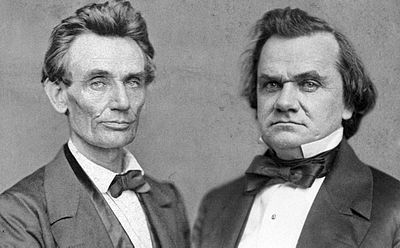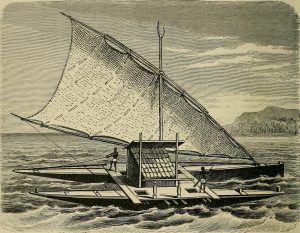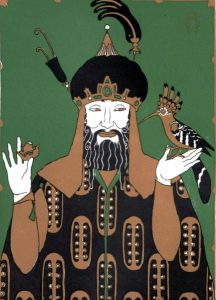The year was 1858, and the day was August 21 in the city of Ottawa, Illinois. It was dusty and hot, and there were about 12,000 people waiting in the audience around a speaking stand for a train to come in from the nearby city of Morris. The people were waiting for the arrival of Abraham Lincoln. Stephen Douglas had already arrived, and he was accompanied by a number of people as he made his way towards the speaking stand. These two men drew a very large crowd, because they were about to debate each other on issues of great national importance. The debate that was to take place this day was the first of a series of seven debates that would go down in history as “The Lincoln-Douglas Debates of 1858.” Abraham Lincoln would become President two years after these debates, in the Election of 1860. But he was not running for President in 1858. He was challenging the sitting Senator of Illinois for his Senate seat. And Stephen A. Douglas was that United States Senator.
The format for these debates was for the first speaker to give an opening speech for an hour, then the second person was to speak for ninety-minutes, and then the first speaker was to make his closing remarks for half an hour. That first debate in Ottawa was very important, as it was the first of its kind. But the Ottawa debate was something of a trial run for Lincoln, rather than an actual debate. Lincoln did not end up delivering his arguments effectively in Ottawa, which resulted in Douglas dominating the debate. And the topics that were brought up there were not discussed by Lincoln in depth. But by the time Lincoln got to the fifth debate, in Galesburg, we find Lincoln there in his finest form. Lincoln turned the tide of the debates in his favor, and he gained significant momentum for the rest of his campaign.

That fifth debate in Galesburg took place on October 7, and was held at Knox College. It was a windy and rainy day. The platform where Lincoln and Douglas were supposed to make their speeches was too high for either of them to reach through ordinary means, so they both had to climb through one of the windows in the College and then descend from a ladder to reach the speaking stand. Douglas opened his speech by making known his opposition to the Lecompton Constitution, which was the proposed Kansas state constitution of 1857, which was backed by the pro-slavery supporters in Kansas. This constitution proposed that slavery should be permitted, while free blacks should be excluded from living in Kansas.1 It is interesting to note that Douglas sided with the Republicans on this issue, instead of siding with fellow Democrats, such as President James Buchanan. Douglas brought up the topic of the Republican Party, and he asked Lincoln if the Republican Party was trying to destroy the political foundation of the United States.2 He went on to say that the Republican Party did not proclaim its principles in the North nor in the South. He accused Lincoln especially for giving different speeches to different audiences. Douglas claimed that Lincoln altered his views at different debates to appeal to various audiences.3 If Douglas was seen as correct on that matter, he might sway people who were inclined to vote for Lincoln to vote for him instead. Douglas continued his speech by stating that the Declaration of Independence was solely intended for white people in reference to the section in the Declaration where it stated that “all men are created equal.” Douglas believed that it was heretical to claim that the Declaration of Independence was intended for all people.

Lincoln’s response was that nobody before Douglas had claimed that the Declaration of Independence was only intended for white people. Lincoln thought that it was interesting that Douglas was interpreting the Declaration of Independence in the manner that he did, because he believed that black people had no rights and they should never gain any rights. The Declaration of Independence did not explicitly condemn slavery nor mention it, but Lincoln brought up a very convincing point regarding the institute of slavery and how Douglas was interpreting the document incorrectly. Lincoln said that Thomas Jefferson owned slaves but trembled at the thought of God’s justice on the matter of slavery.4
Lincoln then came back to a subject he had mentioned in a previous debate: The Dred Scott Decision of 1857. That was the legal case where the Supreme Court of the United States ruled 7-2 in the decision that Dred Scott, as a black man of slave ancestors, was not a United States citizen, and therefore had no right to sue in a federal court of law for anything, let alone his freedom. It also stipulated that the federal government did not have the power to regulate slavery in the western territories, overturning the Missouri Compromise law of 1820.5 The Dred Scott decision was a bombshell in the political landscape, and Lincoln weighed in on its implications for the future. Lincoln was against this decision because he believed that blacks had the same basic freedoms and rights as whites. But the Dred Scott decision affected all African Americans, whether slave or free, by denying them citizenship, and thereby denying them Constitutional rights. It was in this debate that Lincoln was able to turn the tide of the debates in his favor through his rhetoric.
Stephen Douglas, in his rejoinder, stayed adamant on the notion that Lincoln tailored his speeches to fit a certain audience to garner votes. To illustrate this, Douglas claimed that Lincoln said that blacks were the inferior race to whites at the Charleston debate. Douglas demanded that Lincoln be consistent in his views on slavery and black people. Douglas addressed the matter of the Dred Scott decision, but he only said this regarding the decision: “… that decision would carry slavery into free states, notwithstanding that the decision says directly the opposite.”6 Douglas said this, because he claimed that Lincoln’s interpretation of the Dred Scott decision was incorrect. Lincoln had claimed, as early as his speech in Springfield in June, that the effect of the Dred Scott decision was to turn all states into potential slave states; that slave owners, like Dred Scott’s owner, could take their slaves by the thousands into free states, just as Dred Scott’s owner had, and that those slaves would still be slaves of their owners, even though living in a so-called free state. Douglas limited himself to the above quote regarding his views on the Dred Scott decision, because he did not want there to be controversy among his supporters, because he supported both popular sovereignty and the Dred Scott decision. Popular sovereignty was the doctrine that Douglas had championed earlier in the famous Kansas-Nebraska Act of 1854, where he lured Southern votes to his cause by enabling territories like Kansas to decide for themselves whether to allow slavery in their future state, regardless of whether that territory was above the sacred Missouri Compromise line or not. But popular sovereignty and the Dred Scott decision do not go hand in hand, because they both contradict one another. The Dred Scott decision made clear that a slave could be brought to any state as property, regardless of that state’s popular sovereignty choice. A state that made the decision by popular sovereignty to be a free state was nevertheless bound to admit slavery into its state because of the Dred Scott decision. Douglas put himself in a bind by supporting both of these ideas, because they are not compatible. This is the very reason why Douglas did not discuss the Dred Scott decision in further depth, due to his miscalculation. Douglas went on to claim that Lincoln was going to appeal to the Supreme Court to repeal the Dred Scott decision.7 It seemed as though Lincoln had caught Douglas off guard in this debate, and Lincoln accomplished his goal of swinging the momentum of the debates in his favor. Lincoln needed to do well in this debate in particular, because he did not want Douglas to dominate the debates, and catching Douglas off guard was one of the best outcomes possible for Lincoln here in Galesburg. Douglas, for the most part, repeated many of the topics stated in his opening speech, which showed that he did not have substantial answers to Lincoln’s questions.

The Lincoln-Douglas debates were one of the most influential and famous debates in American history. It was these debates that laid the groundwork for the way debates would be performed in the future. After these debates, these men continued to give speeches in various cities, and they continued campaigning until it was time for the election. The election results, as determined by the legislature, gave Stephen Douglas the victory at 54 votes in his favor as opposed to the 46 votes that Lincoln amassed. Although Lincoln lost this election, he gained much notoriety from his campaign against Douglas, so much so that he was eventually nominated as the Republican Party’s candidate for the Presidential election of 1860. Douglas also secured his nomination for the Democratic Party in the Presidential election of 1860, partly because of the stands he made against Lincoln in these debates. The tables would be turned on Douglas in a matter of two years, as Lincoln defeated Douglas and other prominent politicians in that eventful Presidential Election of 1860. Given that outcome, it begs the question of who really won the Lincoln and Douglas debates. Stephen Douglas may have won his reelection in 1858, but he effectively split the Democratic Party in doing so. Although Lincoln did not become a senator, he set himself up for success as the future President of the United States.
- Robert McNamara, “Lecompton Constitution,” ThoughtCo., February 24, 2018, https://www.thoughtco.com/lecompton-constitution-1773330. ↵
- Allen Johnson, Stephen A. Douglas: A Study in American Politics (New York: The Macmillan Company, 1908), 383. ↵
- Paul Angle, Created Equal? The Complete Lincoln-Douglas Debates of 1858 (Chicago: The Chicago Historical Society, 1958), 292. ↵
- Allen Guelzo, Lincoln’s Emancipation Proclamation (New York: Simon and Schuster, 2004), 22. ↵
- James McPherson, Abraham Lincoln and the Second American Revolution (New York: Oxford University Press, 1991), 48. Dred Scott had sued for his freedom, because his master had freely brought him to Illinois for a time in the 1830s. Illinois was, of course, a free state. Much later, in the late 1840s, Dred Scott sued for his freedom on the basis that he had lived in that free state for a certain amount of time, which, he believed, entitled him to his freedom. Dred Scott’s original master, John Emerson, had died, and Scott then belonged to Emerson’s wife. ↵
- Paul Angle, Created Equal? The Complete Lincoln-Douglas Debates of 1858 (Chicago: The Chicago Historical Society, 1958), 319. ↵
- Kenneth Winkle, Lincoln’s Citadel (New York: W. W. Norton and Company, 2013), 62. ↵



91 comments
Matthew Wyatt
President Lincoln is often viewed as one of the greatest orators in American history, but it is important to remember that he was not infallible. This article does a good job highlight a moment of political defeat in Lincoln’s life, which shows us that, despite his demi-god-like characterization in the American Zeitgeist, he was in fact just a man. Though the conclusion of the article asks whether or not this defeat enabled Lincoln to eventually win the presidency (which is entirely plausible), I find that the more important take away is the fact that the man was capable of losing. Every great figure in history was also just human; a reality we easily forget.
Robert Rees
Overall this is a very informative article, and I commend the author for focusing on and often over looked part of Lincoln’s life. Generally, I would think most people would think about what President Lincoln did and said during his time in office, rather than what he did before being elected. The detailed account of the debates while quite long, are written well enough that the reader does not become bored, while still being very informative.
Angel Torres
Debates are a very important part of elections. During debates each candidate can express their thoughts and ideals on national issues to the public. The issues that were debated among the 1958 election were very controversial at the time. One had the South wanting slavery and one had the North wanting to end slavery. Douglas may have won the battle for senate, but Lincoln won the war two years later during the presidential election. The information presented was informative and well written.
Enrique Segovia
The Lincoln-Douglas Debates of 1858 are important to American history because they set new standards for debating, and they allowed the American people detect Lincoln’s potential as a politician. Although Douglas was already the Senator, it is interesting how Lincoln had the courage to challenge him for the position. Even though he did not win, Lincoln was now perceived as such a great speaker that even the Republican Party nominated him as their presidential candidate for 1960, when he won the election for President of the United States.
Robert Freise
This article was really great and it gave me abetter sense of how influential and great Lincoln was. He fought and stould up for slaves and he obviously knew how unjust and immoral the treatment of the African Americans was. If Lincoln had failed and he had lost, I couldn’t imagine how long slavery would have lasted and how much worse racism and discrimination would of lasted. This article really showed how Lincoln hlped defeat the ignorance of racism and how his win helped change lifes.
Sienna Guerra
This debate was very controversial and I knew that there was something important about the debate but I have not heard or known the context since high school! This article was a very good refresher. It is a very good thing that Lincoln won because if he hadn’t, there would be no freedom from slavery and it would have been worse.
Christopher Hohman
Nice article. The Lincoln and Douglas debates were so important to the future not just of debates and the way they were held, but also in shaping the future of the country. Lincoln did not win the election, but he responded to Stephen Douglas very eloquently and did such a great job refuting Douglas. In that way Lincoln actually won because he became so well known that he was able to win the 1860 election for president.
Luis Magana
I never really believed in slavery because I feel like it makes a person be seen as if they are not human when they really are and should be treated the same. Slavery should of never even been a thing I don’t understand how someone could just make a person of different color a slave. If Lincoln had never won who knows how the world would be like today and the question could arise that if slavery would of still ended if Lincoln didn’t win.
Greyson Addicott
I must give this article and author props for delving into the divide that the United States was experiencing at the time period. The debates were only a prerequisite to the death of the original compact between the states and the Federal government. In the words of John C. Calhoun, “Now, let me say, Senators, if our Union and system of government are doomed to perish, and we to share the fate of so many great people who have gone before us, the historian, who, in some future day, may record the events ending in so calamitous a result, will devote his first chapter to the ordinance of 1787.. [and] his next chapter will be devoted to the Missouri compromise.” The article itself did the debates a great justice by describing the particular climate in the United States at the time!
Andrea Cabrera
The article did an incredible decent job of explaining the narrative of this complex story. I remember been in school and reading Douglas speech about the Fourth of July doesn’t mean anything to the slaves since they weren’t free. I knew that Lincoln had controversial views during the time, and Douglas was very admirable by calling him out. The political elements that are portrayed in this article still relate to today’s political climate.